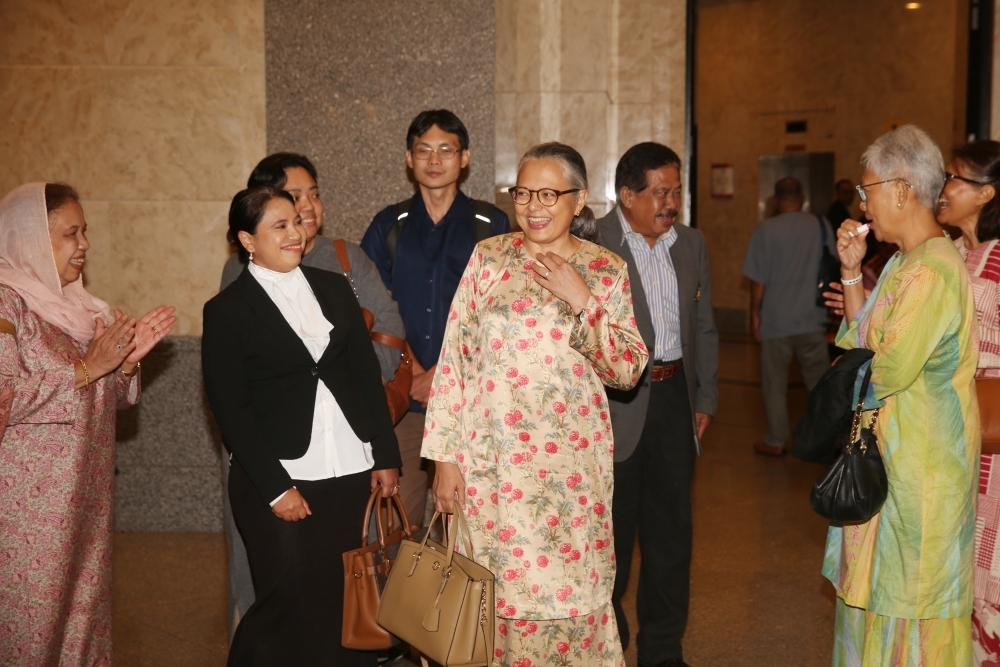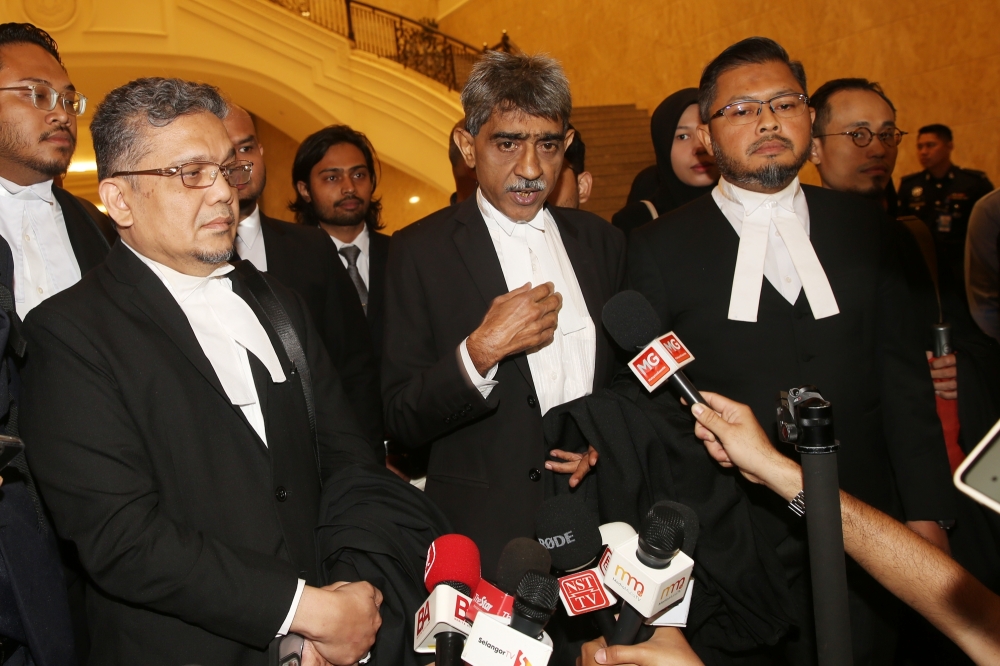
Federal Court declares Selangor fatwa partially invalid, no more ‘sesat’ or deviant label for SIS

Sisters in Islam (SIS) executive director Rozana Isa seen with supporters after the Federal Court ruled in favour of SIS in its appeal against a 2014 Selangor fatwa labelling it “deviant”, at the Palace of Justice in Putrajaya June 19, 2025. — Picture by Choo Choy May
Thursday, 19 Jun 2025 10:02 AM MYT
PUTRAJAYA, June 19 — Muslim women’s rights group Sisters in Islam (SIS) today won its nearly 11-year-long court challenge against a Selangor fatwa, which means that its company — SIS Forum (Malaysia) — is no longer labelled “sesat” or deviant from Islamic teachings.
Chief Justice Tun Tengku Maimun Tuan Mat, who chaired the Federal Court’s five-judge panel, read out the majority judgment which quashed parts of the Selangor fatwa.
The Selangor fatwa, issued in 2014, had four paragraphs:
1. SIS Forum (Malaysia) and any individual, organisation or institution who hold on to “liberalism and religious pluralism” are “deviants” from Islamic teachings.
2. Any publications with elements of liberalism and religious pluralism should be banned and can be seized.
3. The Malaysian Communications and Multimedia Commission (MCMC) is to block social websites that go against Islamic teachings and hukum syarak (Islamic law).
4. Any individuals holding on to liberalism and religious pluralism should repent and return to Islam.
Now, the Federal Court said the first paragraph was only valid for the part where it referred to individuals (and which means that the parts referring to SIS Forum, organisation and institution are no longer valid), and the second and third paragraphs are also invalid, while the fourth paragraph remains valid.
Among the key reasons given are that Selangor's Islamic authorities had exclusive jurisdiction to make the parts of the fatwa (first and fourth paragraphs) that referred to individuals as it relates to persons professing the religion of Islam and in line with their scope of powers in the Federal Constitution.
However, the Federal Court said that Selangor did not have the powers toissue the fatwa's second and third paragraphs, as it involves federal agencies and federal agencies' powers and does not relate to persons professing the religion of Islam.
The two other judges on the panel who supported the majority judgment are President of the Court of Appeal Tan Sri Abang Iskandar Abang Hashim and Federal Court judge Tan Sri Nallini Pathmanathan.
Federal Court judge Datuk Abu Bakar Jais was the only judge who dissented, and read out his minority judgement where he gave his opinion that the Shariah courts should be the one to decide on the legality of the fatwa.
Federal Court judge Datuk Abdul Karim Abdul Jalil had also sat on the panel but is now retired.
While Abdul Karim had retired, the Courts of Judicature Act's Section 78 means that the decision today can still be delivered by the remaining judges as there was a majority decision.
It is only if there is no majority that the case has to be reheard.
This means that SIS won its appeal today in a 3-1 decision at the Federal Court, which is the highest court in Malaysia.
Federal Court comments not on fatwa’s contents, but on state’s scope of powers in Federal Constitution
In delivering the brief grounds of her decision, the chief justice said the Federal Court had in previous cases said that the duty to interpret the Federal Constitution is with the civil courts, and that past decisions had also said the civil courts are the ones who have judicial review powers.
While the court case today is on Selangor's fatwa, Tengku Maimun made it clear that the Federal Court is not making any comments or giving any opinions about the contents of the fatwa, especially the phrase on "liberalism and religious pluralism are deviant from Islamic teachings" and "any individuals who hold on to liberalism and religious pluralism should repent and return to Islam".
Tengku Maimun said this is because the contents of the fatwa or religious edict is within the exclusive jurisdiction of the Selangor state government and the state's Islamic authorities.
Instead, the chief justice said the Federal Court's decision was only on the constitutional limits or scope of powers that Selangor's authorities have when making a fatwa.
"Although parties' dispute here is in relation to fatwa, or in other words, although the subject matter of the dispute is about fatwa, the issue before us is about the interpretation of the words 'persons professing the religion of Islam' in Item 1, List II - State List, Ninth Schedule of the Federal Constitution," she said.
In the Federal Constitution, there are two lists in the Ninth Schedule, namely List I or Federal List which lists down the areas that the federal government can make laws on, and List II or State List which states what the state government has powers to make laws on.

Counsels Haniff Khatri Abdulla, Zainul Rizal, and Yusfarizal Yussoff speak to the media after the Federal Court ruling on SIS’s appeal against the 2014 Selangor fatwa, in Putrajaya, June 19, 2025.
Federal Court says it again: Companies cannot profess Islam
The Federal Court made it clear today that the Selangor fatwa could not apply to any company, as the Federal Constitution's State List's Item 1 would only give powers for the fatwa to be issued on actual human beings professing the religion of Islam.
This is because companies (as artificial persons) cannot profess the religion of Islam, unlike humans (natural persons) who can profess and practise the religion.
"In line with our findings above and in line with past decisions of the superior courts, we find that the words 'persons professing the religion of Islam' in Item 1, can only refer to natural persons and not artificial persons like a company," she said.
"The interpretation of this constitutional provision is in line with the position that only an actual human can recite the 'kalimah Syahadah', perform solat (prayers), fast during the Ramadhan month, and perform hajj — matters that are pillars of the religion of Islam.
"In the same context, a company, as an artificial person has no capacity to repent as suggested by that fatwa," she said.
"With this, it is our finding that a company cannot 'profess' the religion of Islam for it to be validly classified as 'persons professing the religion of Islam' in Item 1," the chief justice said.
The Federal Court also said there was no need to lift the “corporate veil” — a legal principle that allows liabilities to be imposed on a company’s shareholders or directors instead of treating them as separate entities.
In today' case, the court noted that companies, organisations or institutions naturally have individuals running them.
The Federal Court pointed out that any individuals — responsible for any actions of companies, organisations or institutions which breach the Selangor fatwa — would still be bound by the fatwa's first and fourth paragraphs which mention "individuals".
The Federal Court noted that the Selangor fatwa had clearly specified individuals and companies (although the part referring to companies is now invalid), and the fourth paragraph had specifically only required "individuals" with liberalism and religious pluralism beliefs to repent and return to Islam.
The Federal Court said there was no issue of any companies, organisations or institutions being allowed to not be responsible for actions breaching the Selangor fatwa, as the responsibility for any breach of this fatwa lies on the individuals operating them.
Tengku Maimun concluded by saying the Federal Court set aside the High Court's and Court of Appeal's decisions, and ruled in favour of SIS Forum by invalidating the parts of the Selangor fatwa that mentioned organisations and institutions and touched on federal agencies' powers.
Previously, the High Court in August 2019 rejected SIS Forum's challenge against the fatwa by saying Shariah courts should decide the case, while the Court of Appeal in March 2023 in a 2-1 decision had also dismissed SIS Forum's challenge.

Recommended reading:
‘Deviant’ or not? Sisters in Islam awaits Federal Court verdict today on Selangor fatwa
half-hearted judgments that DON'T nail the frogs to the board!
ReplyDelete